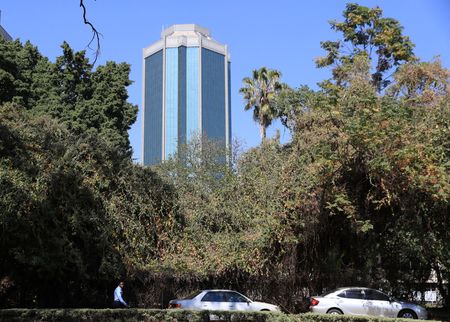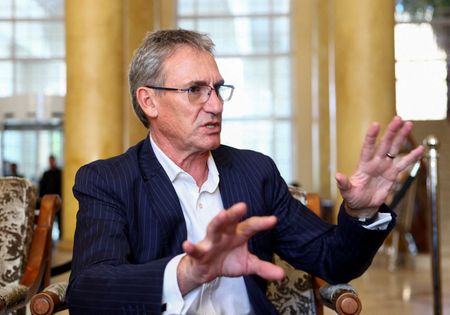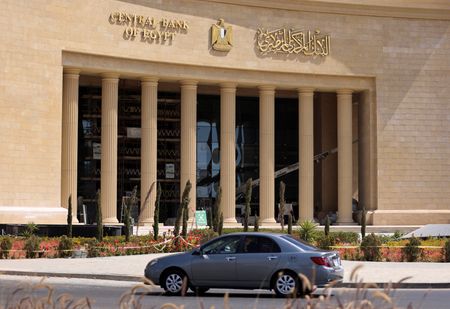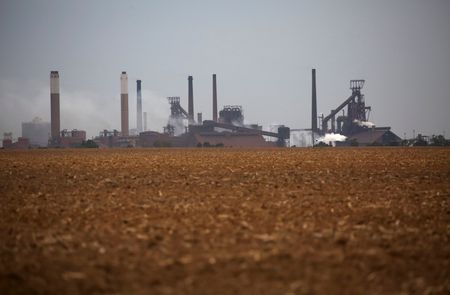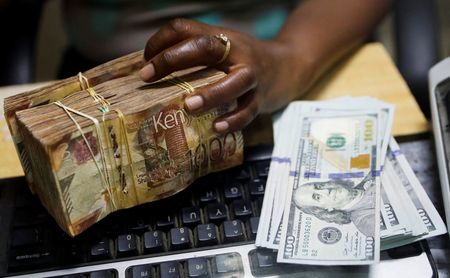By Marc Jones
LONDON (Reuters) – European shares hit a record high, gold was near one of its own all-time peaks and bond markets were back under pressure on Thursday as focus flipped back to where global interest rates and tech stocks are heading after days of trade war angst.
Britain’s pound took a tumble as the Bank of England cut by another quarter point, but Europe’s shares were buoyant again as encouraging signs from drugmaker AstraZeneca and miners helped the STOXX 600 climb 0.7%. [.EU]
Wall Street wasn’t looking quite so upbeat, with S&P 500 futures and Nasdaq futures broadly flat. [.N]
Amazon’s earnings are due later, with the pressure on to deliver on lofty expectations for cloud computing after lacklustre reports from Microsoft and Alphabet this week. [.N]
A weekly jobless claims report is also due before markets open, leading up to the all-important January nonfarm payrolls report on Friday.
On the Bank of England’s widely-expected rate cut, meanwhile, Royal London’s head of rates and cash, Craig Inches, said the broader market barometer had swung back to worrying about global growth in the last couple of weeks.
That has caused a “washout” for those betting against bonds and leaves plenty of interest in what BoE chief Andrew Bailey now sees, given markets have repriced where UK rates are likely to end up – down to 3.75% from around 4.10% a month ago.
The UK central bank also halved its forecast for growth this year to 0.75% – reflecting weak business and consumer sentiment – although forecasts for annual growth in 2026 and 2027 were revised fractionally higher to 1.5% from 1.25%.
“What we are looking for clues on from Bailey is whether what we have got priced in is in line with his thinking, or have we gone too far?” Inches said.
“I think the Bank will want to get itself back in the middle of the pack” of other European central banks, Inches added, given that the UK is seeing the “wrong” kind of inflation and growth is “on its knees”.
RATE EXPECTATIONS
Though uncertainties remain about new U.S. President Donald Trump’s plans for global trade, the economy and diplomacy, markets seem for the most part relieved that things haven’t been worse, particularly with regard to tariffs.
China’s central bank again set a stronger-than-expected yuan midpoint fixing overnight, though the currency still weakened after Beijing sought the World Trade Organization’s intervention to rule on Trump’s latest 10% tariffs on Chinese imports.
China’s commerce ministry also said on Thursday that Beijing was ready to work with other countries to jointly respond to the challenges of unilateralism and trade protectionism, and it branded U.S. tariffs “vile”.
The onshore yuan last stood at 7.2845 per dollar, while its offshore counterpart eased 0.05% to 7.2862. Meanwhile, China’s CSI300 blue-chip index jumped more than 1%.
“Chinese authorities at this stage are not indicating or showing any intention of weakening the yuan as part of the response to the tariffs. I think that has definitely helped to calm the market down,” said Khoon Goh, head of Asia research at ANZ.
Global government bond yields – a proxy of what countries pay to borrow – were rising again in Europe after falling to one-month lows in recent sessions.
U.S. Treasury Secretary Scott Bessent had said on Wednesday that while Trump wants lower interest rates, he will not ask the Federal Reserve to cut rates.
Bessent also said that he and Trump were intently focused on the 10-year Treasury yield.
“Certainly those comments were interesting, and perhaps a little surprising, though (they) likely suggest that Bessent is having something of a moderating influence on Trump,” said Michael Brown, senior research strategist at Pepperstone.
Futures point to just about 45 basis points worth of easing from the Fed by the year-end..
In currencies, the dollar was also on the rise again, up 0.4% against a basket of major currencies despite touching an eight-week low against the yen in Asia after the Bank of Japan’s Naoki Tamura advocated continued interest rate hikes.
The euro fell 0.5% to $1.0359, while the BoE cut pushed sterling down nearly 1% to below $1.24.
Benchmark BoE rates are now at 4.5% but still one of the highest among the large rich economies albeit the same level as in Norway and close to the U.S. Federal Reserve’s 4.25-4.5% range.
In commodities, oil prices rose, steadying from a sell-off the previous day when a large build in U.S. crude and gasoline stockpiles signalled weaker demand and worries about a new China-U.S. trade war fuelled fears of softer economic growth.
U.S. crude edged 0.42% higher to $71.33 a barrel, while Brent crude rose 0.31% to $74.84 per barrel.
Gold eased a touch from a record peak it struck on Wednesday and was last at $2,860.11 an ounce. [GOL/]
(Additional reporting by Rae Wee in Singapore; editing by Gareth Jones and Susan Fenton)




